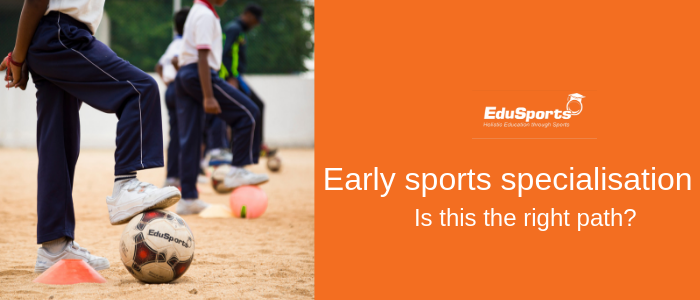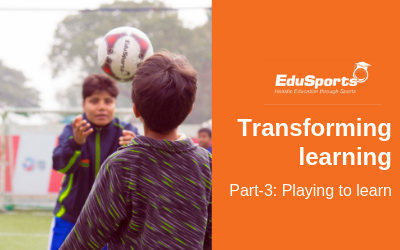“To succeed is to have failed” – learning from failures

Early sports specialisation – Is this the right path?
Steffi Graf started practicing on a court at the age of four, played her first tournament at five and turned pro at 13 years of age. Nadia Comaneci was 14 when she created history by scoring a perfect 10 in Gymnastics at the 1972 Olympics. Some of the successes that the Chinese athletes have recently experienced can be attributed to their early sports specialization and rigorous practice. But is early specialization, towards any sport, the right direction for a child?
Whilst several pieces of evidence; specifically, in sports like gymnastics and swimming, justifies the importance of early sports specialization, there are cases, particularly in sports like football and basketball, wherein exposure to multiple sports at an early age has resulted in players acing a particular sport at the later stage. For instance, former NBA star and two-time Most Valuable Player (MVP) awardee, Steve Nash got his first basketball when he was 13 years old. He has always credited his background in soccer for making him a great basketball player.
Studies have shown that several successful athletes, performing at the ‘elite’ level, have a strong physiological foundation due to their exposure to multiple sports at their early training stages. Various personalities like Pete Carroll, former USC and Seattle Seahawks Football coach said, “The initial questions I often ask about a kid are, ‘What other sports does he play? What does he do? What are his positions?” It has been medically, scientifically, and psychologically recommended that the best way to develop all-round athleticism in a child is ample free play and sports diversification.
Though there are several benefits, early specialization has also been associated with the frequent, rigorous and intense practice, often straining the children/young athletes both physically and mentally. Several swimming coaches are known to train kids, as young as 8 years, for approximately 9 hours per week, covering an average of 14kms. Former tennis player, Andre Agassi’s autobiography titled ‘Open: An Autobiography’, discusses the trauma that he experienced, because of being pushed by his overbearing father, to an extent that he did not enjoy the sport. Furthermore, the early success experienced by Boris Becker and Steffi Graf led to an extensive list of early sports pros, including Jennifer Capriati who struggled with various injuries, emotional issues, and drug abuse.
When does the fun activity of playing a sport, turn into something serious that takes away the joy of playing? Dr. Selleck has defined fun as an activity when an individual is fully engaged, entirely connected to his/her co-players and stretched a little bit beyond his/her limits.
After winning the 2012 NBA championship, Lebron James and Dwyane Wade were asked about the sports they played as children? To which they reminisced all the games that they created on the fly, with one common theme – “fun”. The idea of having fun while playing was very prominent in nearly every conversation with the top 100 athletes whom Ethan J Skolnick and Dr. Andrea Corn had interviewed for their book titled, “How to raise your game.”
There is a school of thought that believes most sportspersons fade away once they reach thirty. However, with Roger Federer continuing to win Grand Slams well into his thirties and MS Dhoni looking sharper than any other young wicket-keeper behind the stumps, this belief is being questioned.
Children have fun when they are learning something new. Exposure to multiple sports often results in children creating their own games. It stops being fun when a child feels playing a sport is no different than carrying out a task.
It is recommended that kids should be exposed to a fun environment so that they can experience the magic of sports, through the right level of encouragement and support, from schools, parents, and coaches.
As Steve Nash rightly said: “Encourage, support and be there for them, make it fun, and then you’ve got a better chance for a kid to gravitate towards sports. And hopefully away from some other things.”
https://schools.sportzvillage.com///wp-content/uploads/2021/04/Krish-Iyengar.png" alt="" width="112" height="150" />
Author
Krish Iyengar
Business Head, EduSports







